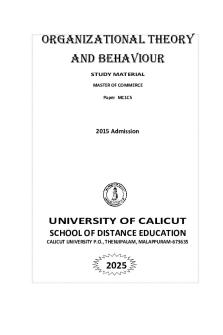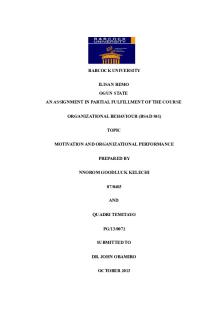Behaviour Change and Collective Intelligence PDF

| Title | Behaviour Change and Collective Intelligence |
|---|---|
| Author | Taslima Begum |
| Course | Organisational Behaviour |
| Institution | Brunel University London |
| Pages | 2 |
| File Size | 192.3 KB |
| File Type | |
| Total Downloads | 31 |
| Total Views | 132 |
Summary
lecture notes...
Description
Behaviour Change and Collective Intelligence
WHAT PREDICTS BEHAVIOUR?
Using Theory to Design Effective Health Behaviour Interventions. Communication Theory Martin Fishbein & Marco Yzer (2003)
It is important to understand what predicts behaviour change. Skill in knowing how does not predict performance or action – it is not enough. There is a lot more that drives a person’s behaviour. Motivation is a synonym for attitude and attitudes influence intention. Self-efficacy is the belief of one’s capabilities – perceived behavioural control. Belief – a causal relationship, subjective and it is difficulty to change someone’s belief – influenced by a lot of factors.
Iceberg Metaphor – the part of the iceberg that is not visible, to the eye and is what we often don’t see, meaning, a lot is hidden about behaviour.
HOW TO MOVE TOWARDS UNDERSTANDING TEAM BEHAVIOUR? UNCOVERING (LARGELY HIDDEN) TEAM BELIEDS
There is a hierarchy To understand team behaviour, you must get between the watershed What is beneath the watershed is often related to attitudes, and evaluated judgement that drives behaviour Note: Norms are difficult to change because they have a great social influence and often conditioned into people through culture. People are more likely to be obedient and compliant. Safety (compliance) vs. risk (breaking boundaries). Management Guru Peter Drucker famously stated that: “Culture eats strategy for breakfast”
In a very practical sense: No matter what business strategy or strategic plan you try to implement with your team, its success and efficacy are going to be held back by the people implementing the plan. It means that if the people driving the strategy aren't passionate about the change, or worse, are apathetic to their job and to their organization, then you stand no chance implementing a plan. You'll even have a hard time executing your normal business strategy, at the minimum. What can you do today to start creating culture change in your organization? There are lots of great managers who work well with people; What might be missing is the underlying drive of culture in your organization. Fundamental Attribution Error: The claim that in contrast to interpretations of their own behaviour, people place undue emphasis on internal characteristics of the agent (character or intention), rather than external factors, in explaining other people's behaviour. The effect has been described as "the tendency to believe that what people do reflects who they are"...
Similar Free PDFs

Collective Intelligence skill
- 1 Pages

Collective Bargaining
- 11 Pages

collective security
- 18 Pages

Groups and Intergroup Behaviour
- 4 Pages

Neurotransmitters AND Behaviour
- 2 Pages

Organizational theory and behaviour
- 186 Pages

Collective Cabinet Responsibility
- 11 Pages

Self & Collective Efficacy
- 5 Pages

Globalization AND Change
- 11 Pages

Managing change and innovation
- 3 Pages
Popular Institutions
- Tinajero National High School - Annex
- Politeknik Caltex Riau
- Yokohama City University
- SGT University
- University of Al-Qadisiyah
- Divine Word College of Vigan
- Techniek College Rotterdam
- Universidade de Santiago
- Universiti Teknologi MARA Cawangan Johor Kampus Pasir Gudang
- Poltekkes Kemenkes Yogyakarta
- Baguio City National High School
- Colegio san marcos
- preparatoria uno
- Centro de Bachillerato Tecnológico Industrial y de Servicios No. 107
- Dalian Maritime University
- Quang Trung Secondary School
- Colegio Tecnológico en Informática
- Corporación Regional de Educación Superior
- Grupo CEDVA
- Dar Al Uloom University
- Centro de Estudios Preuniversitarios de la Universidad Nacional de Ingeniería
- 上智大学
- Aakash International School, Nuna Majara
- San Felipe Neri Catholic School
- Kang Chiao International School - New Taipei City
- Misamis Occidental National High School
- Institución Educativa Escuela Normal Juan Ladrilleros
- Kolehiyo ng Pantukan
- Batanes State College
- Instituto Continental
- Sekolah Menengah Kejuruan Kesehatan Kaltara (Tarakan)
- Colegio de La Inmaculada Concepcion - Cebu





